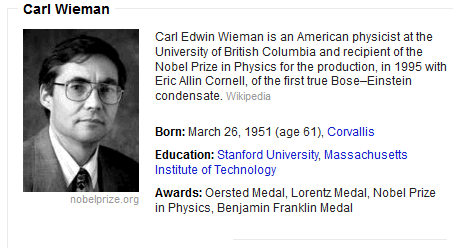|
News & Views item - September 2012 |
![]() Carl Wieman Tells Congress What's Wrong With STEM Education. (September 21,
2012)
Carl Wieman Tells Congress What's Wrong With STEM Education. (September 21,
2012)
 Carl
Wieman until this past June was for three years associate director for science
within the White House Office of Science and Technology Policy (OSTP) and
specifically charged with efforts to improve U.S. science education.
Carl
Wieman until this past June was for three years associate director for science
within the White House Office of Science and Technology Policy (OSTP) and
specifically charged with efforts to improve U.S. science education.
Yesterday he treated the the US Senate's commerce and science committee to his assessment of the state of science and math education in the United States. Much of it is pertinent to Australian STEM education.
Jeffrey Mervis writing in ScienceInsider notes that: "His testimony drew on an article he wrote about applying new research to improve science education that appears next week in Issues in Science and Technology, a quarterly publication of the U.S. National Academies."
Professor Wieman told the committee: "There has been very little change in the level of interest in STEM or the mastery of STEM subjects by U.S. students in the past few decades," and elaborated saying that the problem stems from the way most teachers are trained and most students are taught. "The mastery of science and math is not a matter of simply transferring knowledge into the brain, which is the traditional model, rather, such learning and expertise is a response to strenuous practice."
And he drew an analogy with sports: "[It's] a lot like effective coaching. First, the coach figures out the central skills needed, creates challenging practicing activities that the players carry out, motivates them to achieve that level of expertise, and offers frequent and targeted instruction. All these techniques apply to teaching STEM. … This approach has been demonstrated, but it's profoundly different than what is found in the typical K-12 or college classroom."
But there were powerful disincentives which were impeding improving STEM teaching:
Most universities place a higher priority on research productivity than on student learning,
Professional development for teachers
already in the classroom is based on a flawed premise that
teachers who haven't learned the needed skills during university can somehow
acquire them through
some type of "voluntary, intermittent, after-hours activity."